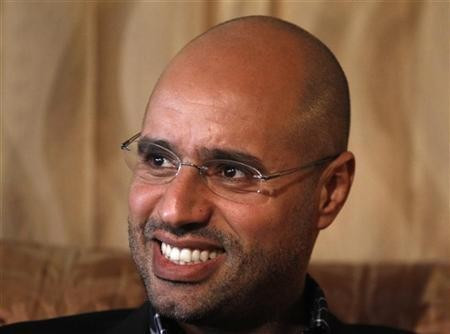Gadhafi's “Alliance Deal” Rejected by Islamists as They Prefer the Rebels

After months of blaming al-Qaeda style Islamists for the uprising that led to the implementation of a NATO-led operation in Libya, the Gadhafi regime it seems is ready for an image overhaul.
Sporting a new beard and fingering Islamic prayer beads while the timing of his interview with The New York Times coincided with the first few days after the start of Ramadan, the Muslim holy month, Saif al-Islam Gadhafi, Moammar Gadhafi's son and close confident warned that the regime was ready to launch a crusade on its opponents.
''We will have peace during Ramadan,'' 'The liberals will escape or be killed,'' The New York Times reported Saif al-Islam Gaddafi as saying. ''We will do it together,'' ''Libya will look like Saudi Arabia, like Iran. So what?'' the newspaper also quoted him as saying.
Saif Gadhafi's latest move has left more than one observer perplexed as threatening to form an alliance with Islamist is unlikely to impress neither the Libyans nor the few countries that called for a ceased fire from both the Gadhafi and the rebels forces. Saif's father and Libyan leader Moammar Gadhafi has in the past called for mass attacks on the rebel forces, but very few of them have materialised.
Saif also repeated the government's contention that Islamists were behind last week's killing of General Abdel Fatah Yunis, who was Moamer Kadhafi's right-hand man for decades prior to his defection earlier this year.
"They decided to get rid of those people -- the ex-military people like Abdel Fatah and the liberals -- to take control of the whole operation," Seif told the Times. "In other words, to take off the mask."
Could the idea of an Islamist-style revolution in the middle of Ramadan just turn out to be a PR stunt from the Gadhafi clan?
Gadhafi said he had talked to prominent figures from the Islamist movement and while, Ali Sallabi, a leading Islamist movement acknowledged he had spoken to Saif he formally dismissed any suggestion of an alliance, saying instead that the Libyan Islamists supported rebel leaders' calls for a pluralistic democracy without the Gadhafis.
''Liberals are a part of Libya,'' ''I believe in their right to present their political project and convince the people with it.'' Sallabi said.
According to Sallabi Gadhafi was also the one who first contacted the rebels.
''There were many discussions between him and the opposition,'' Mr Sallabi said. ''The first thing discussed is [the Gaddafis'] departure from power.''
Hinting that there is no love lost between the Islamists and the Gadhafi camps, Sallabi also denied claims islamists were responsible for the murder of General Younis.
"We condemn the criminal act against the martyr Abdel Fatah. We support probing the murder to put the killers on trial, regardless of their identity," he said.
"It is impossible that Islamists did such heinous crime. We condemn extremism and radicalism ... Islamist or secular."
Sallabi said "there are strong signs that the fifth column of Gaddafi's regime was behind the murder."
Gadhafi is not the first politician to resort to religion when support starts crumbling. In 2003, Saddam Hussein's whose party was mainly perceived as secular Arab nationalist party launched a "faith campaign", in 1994, just as anti-western feeling in the region saw an increase.
The campaign pushed for mandatory Qur'an studies in schools, new training centres for imams (Muslim teachers), which included the creation of a Saddam College (for Iraqis) and Saddam University of Islamic Studies (for foreigners) alcohol was banned in restaurants. And Saddam himself was often shown in prayer.
Leaders have used religion for political ends for a very long time but Islam has increasingly become a propaganda tool used by leaders embroiled in fights with western powers and defining the opposition as made up of liberals only departs from reality since clearly as Sallabi demonstrates Islamists movements in Libya appears to support the rebels.
© Copyright IBTimes 2025. All rights reserved.





















